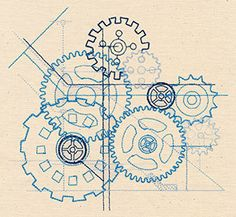Strengths and Behaviors

Understanding your strengths and behaviors can help you be more effective in your career and personal life. We are naturally good at certain things and we work better with some people better than others. I think it’s important to not only understand yourself but the team you work with as well.
Myers-Briggs Type Indicator (MBTI)
Based on the conceptual theories of Carl Jung, Katharine Cook Briggs and Isabel Briggs Myers published the first version of the MBTI in 1944. Their belief was that women who were entering the industrial workforce during WWII would be more able to identify what war-time jobs would be most beneficial to them.
A lot of people are familiar with the Myers-Briggs Type Indicator in which you take an assessment and can be grouped into one of 16 distinctive personality types. Each personality type is made of 4 different dimensions, world, information, decisions, structure.
- World: The scale of you prefer to view and interact with the world. Extraversion (E) or Introversion (I)
- Information: How you prefer to process information. Sensing (S) or Intuition (N)
- Decisions: Preference of focusing on logic and consistency or circumstances. Thinking (T) or Feeling (F)
- Structure: Prefer decisions being made or stay open to options. Judging (J) or Perceiving (P)
Now just because you take the assessment and are placed as an ‘ENFJ’ doesn’t mean you don’t having the ability to use introversion techniques or communication style. It just means that you prefer one style over the other.
For the record,
I am a ISTJ.
I’m a bit of a flip-flop on the extraversion to introversion. I consider myself to be one of the more extraverted software developers that I know. I prefer to deal with cold-hard facts make decisions on based on data. I’m usually quick to make a decision (if I have enough data to satisfy it) and don’t like to be waiting days, weeks, or months on someone to make up their minds when we are (seemingly) wasting time.
Myers-Briggs Type Indicator gives you a good perspective on what kind of behavior you learn towards on a grand level but we can take a bit deeper of a dive by looking at your strengths finder.
StrengthsFinder
StrengthsFinder was developed by the America psychologist, Donald O. Clifton. This personal assessment will determine your top 5⁄34 strengths. This strengths can be grouped into 4 categories:
- Relationship Building: Adaptability, Connectedness, Developer, Empathy, Harmony, Includer, Individualization, Positivity, Relator
- Influencing: Activator, Command, Communication, Competition, Maximizer, Self-Assurance, Significance, WOO
- Strategic Thinking: Analytical, Context, Futuristic, Ideation, Input, Intellection, Learner, Strategic
- Executing: Achiever, Arranger, Belief, Consistency, Deliberative, Discipline, Focus, Responsibility, Restorative
There’s a lot of dimensions to describe and there’s tons of resources that can explain it better than I can, so I’m going to just list my top 5 strengths and give a small description of each.
1. Learner
Learning is my favorite thing to do. In fact, this one of the reasons I decided to start blogging frequently. The process of acquiring, understanding, and applying learned skills in order to create a finished good is incredibly exciting to me. It fascinates me to discover just how much I don’t know and short term projects are kind of my jam.
2. Harmony
I don’t like conflict. I especially don’t like conflict when it’s not promptly resolved. At the heart of any debate I believe there is some common ground that both parties can stand on. Instead of catering opinions to the 1% of the team, I’d rather find consensus among the group. At the end of the day we have a product that needs to get shipped.
3. Consistency
Man, oh man, oh man. I eat, breath, and live processes. It creates a predictable and fair environment. Software builds are repeatable. Software deployments are repeatable. Then why would you change the way your building software just on a whim? It’s dangerous to do and your introducing more variables into your software reducing the predictability and increasing the risk. Decide how you’re going to do it and automate it so it’s repeatable and consistent. Afterwards you can test your hypothesis on a proven solution to determine the effectiveness of the variable.
4. Restorative
I love bringing things back to life. Refinishing old wooden furniture is one of my favorite things to do because bringing something that was once beautiful back to what it once was. I like to solve problems, but I don’t enjoy it when my feet are to the fire. I want to take a calm and non-threatening approach to the work and fix it and make it better than it once was.
5. Analytical
I love looking at data to solve the issue in front of me. Data does not lie. Data can certainly be misrepresented or skewed to favor an agenda, but only if the person is being dishonest or doesn’t understand what they are looking at. I love getting many different ideas and seeing them in practice. What this does is gives me multiple data points in which I can now make better more informed decisions.
I hope this perks your interests in your own behaviors and strengths and I challenge you to go ahead and take these assessments and carry them back with you to your team.
